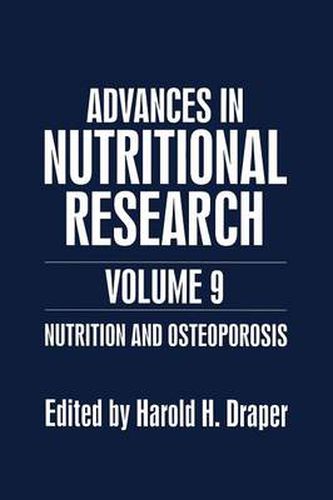Readings Newsletter
Become a Readings Member to make your shopping experience even easier.
Sign in or sign up for free!
You’re not far away from qualifying for FREE standard shipping within Australia
You’ve qualified for FREE standard shipping within Australia
The cart is loading…






This title is printed to order. This book may have been self-published. If so, we cannot guarantee the quality of the content. In the main most books will have gone through the editing process however some may not. We therefore suggest that you be aware of this before ordering this book. If in doubt check either the author or publisher’s details as we are unable to accept any returns unless they are faulty. Please contact us if you have any questions.
Nutrition and Osteoporosis: Seeing Through a Glass, Darkly (1 Cor. 13:12) This volume of Advances in Nutritional Research deals with the present state of knowledge relative to the role of nutrition in the etiology of osteoporosis, one of the most serious degenerative diseases in the aging population. As a back drop for subsequent chapters on specific nutrients, Chapter 1 provides a com prehensive account of the gain and loss of bone throughout the life cycle, with emphasis on the architectural changes in later life that predispose to osteoporotic bone fractures. Chapter 2 documents the occurrence of aging bone loss through out human archeological history and Chapter 3 extends this documentation to all non-human vertebrate species so far examined, including primates living in the wild. It is apparent that a progressive loss of bone tissue is a normal accompaniment of aging among higher vertebrates. Whether it is a cause of bone fractures in animals, as it is in humans, is still unknown. It has also been established that there are significant differences in the frequency of osteoporotic fractures among human families, ethnic groups, national populations and diet cultures. Numerous studies have been carried out in an effort to explain these differences, and many of these deal with the possible effect of nutrition. Protracted controversies over the role of nutrition in the etiology of osteoporosis are reflected in the contents of several of the ensuing chapters.
$9.00 standard shipping within Australia
FREE standard shipping within Australia for orders over $100.00
Express & International shipping calculated at checkout
This title is printed to order. This book may have been self-published. If so, we cannot guarantee the quality of the content. In the main most books will have gone through the editing process however some may not. We therefore suggest that you be aware of this before ordering this book. If in doubt check either the author or publisher’s details as we are unable to accept any returns unless they are faulty. Please contact us if you have any questions.
Nutrition and Osteoporosis: Seeing Through a Glass, Darkly (1 Cor. 13:12) This volume of Advances in Nutritional Research deals with the present state of knowledge relative to the role of nutrition in the etiology of osteoporosis, one of the most serious degenerative diseases in the aging population. As a back drop for subsequent chapters on specific nutrients, Chapter 1 provides a com prehensive account of the gain and loss of bone throughout the life cycle, with emphasis on the architectural changes in later life that predispose to osteoporotic bone fractures. Chapter 2 documents the occurrence of aging bone loss through out human archeological history and Chapter 3 extends this documentation to all non-human vertebrate species so far examined, including primates living in the wild. It is apparent that a progressive loss of bone tissue is a normal accompaniment of aging among higher vertebrates. Whether it is a cause of bone fractures in animals, as it is in humans, is still unknown. It has also been established that there are significant differences in the frequency of osteoporotic fractures among human families, ethnic groups, national populations and diet cultures. Numerous studies have been carried out in an effort to explain these differences, and many of these deal with the possible effect of nutrition. Protracted controversies over the role of nutrition in the etiology of osteoporosis are reflected in the contents of several of the ensuing chapters.